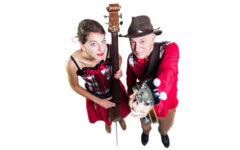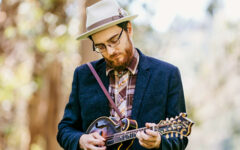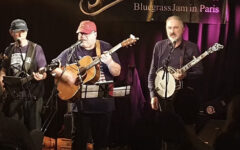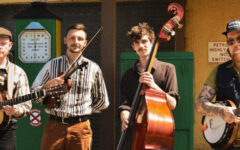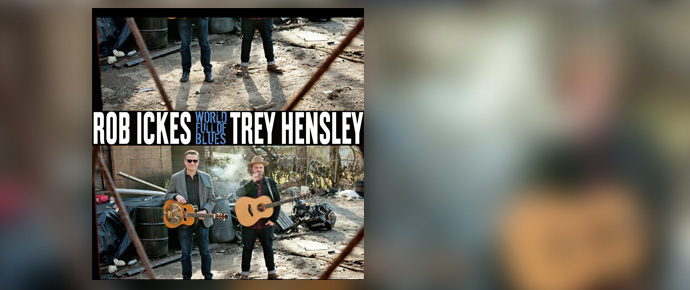
It’s little wonder that Rob Ickes and Trey Hensley have become one of the most talked about duos on the current Grassicana scene. Ickes, a 15 time IBMA Dobro Player of the Year recipient, and Hensley, a 20 something guitar prodigy who’s been honing his licks since the age of 11, make a formidable combination. Their new album World Full of Blues offers all the proof necessary. A melding of different styles and special guests — Vince Gill and Taj Mahal among them — the album represents another pinnacle in their ever evolving career. It’s a remarkably diverse set — blues and bluegrass are only two of the styles represented — but there’s a consistency in the innate melodic presence that flows from track to track.
Nevertheless, as proven on their two previous efforts, Before the Sun Goes Down and Country Blues, the ability to adapt and push parameters is key to their success. One track, Suzanne, even finds the pair swapping instruments without losing a beat. And while the two are responsible for the majority of songs in the set, they also offer two adept covers — the Grateful Dead’s Brown-Eyed Women and guitarist Robben Ford’s Rugged Road. To their credit, it all fits as a whole, making the new album a treasure well worth cherishing.
Bluegrass Today spoke with Ickes and Hensley, and asked them to share their thoughts behind their new effort, and the world of blues — and other sounds — that it shares so succinctly…
For starters — how did you come up with this idea of veering off into the blues?
Trey Hensley: Well, it wasn’t necessarily a decision we talked about. This isn’t really a “blues” album or a “bluegrass album.” I think it’s just a big mix of our influences, which is a wide array of music. Our last records were the same in that regard. We don’t really think in terms of genre when we go in to the studio for our albums.
I think the songs lend themselves a certain way. There are some obvious bluegrass-y songs on the album, some country style ballads, and definitely some blues. It just comes naturally. The blues influence on this record happened really organically.
Rob Ickes: Yeah, there’s some great blues stuff on here, but this album, like our others, feature several genres, or blends of genres. We both listen to all kinds of music, so I think that variety will always be a part of our sound.
Were you surprised at how smooth a segue this was when it came to melding the two styles? What elements did you draw on specifically as far as each genre was concerned?
TH: Well, not necessarily. Rob and I have always leaned on the bluesier side of bluegrass or Americana music. I think we both love bluegrass so much that it definitely comes across in our playing… so does the blues influence. The songs themselves are more in the blues vein, for the most part. It is just a neat mix of everything we are into… it just all comes out sounding like us.
RI: Yeah, maybe the smoothness of it just comes from the musical simpatico between the two of us. There has always been some sort of cohesion, or musical flow, since the first time Trey and I played together. It’s been fun to develop that more with each record. I hear a lot of unison stuff on this record that sounds like we’re totally on the same page, like the melody on Fatal Shore, or the hook on Born With the Blues.
Had you ever thought that indeed blues was an added element to bluegrass?
TH: Most definitely. Bill Monroe was playing blues music with a swing and some pep on these acoustic instruments, and bluegrass music was born. When it comes down to the heart of the matter, almost all American music has a big blues influence. Arnold Shultz was Bill Monroe’s influence. So, blues music has been a huge part of bluegrass from the get-go.
RI: Yes, it’s definitely been there since the beginning — a big part of Bill’s music, and I hear it in Earl Scruggs’ banjo playing also. A lot of the bends, and his guitar playing, had a lot of blues in it.
Can each of you give me an idea of your individual influences? Curious if you had an interest in blues prior to starting this project...
TH: My first love in music was bluegrass and traditional country music. I fell in love with blues in a similar way, just a few years down the road. The first blues album I owned was an Eric Clapton record, Me and Mr. Johnson, a tribute album to Robert Johnson. I bought it because the album cover looked cool and I had kinda heard of Clapton. I got so into that record that I had to go buy the complete Robert Johnson discography. I fell in love with that sound. From there, I just started buying any blues records I could find. Muddy Waters was — and still is — my favorite blues artist, and I found his music by randomly buying a record of his from the blues section of the local record store in Johnson City, Tennessee. I got way into Little Walter, Howlin’ Wolf, Lightning Hopkins, John Lee Hooker, Skip James, B.B. King, Albert King, Freddie King, Taj Mahal, Willie Dixon, Buddy Guy, Sonny Boy Williamson, Blind Willie Johnson, Mance Lipscomb, and a bunch of other great blues artists. As far as all of my individual influences, they go from bluegrass (Flatt & Scruggs, Osborne Brothers, Jimmy Martin, Charlie Waller, Tony Rice, etc.), and traditional country (Merle Haggard, George Jones, Hank Sr., the Jerry Lee Lewis country albums, etc.), to jazz (Miles Davis, John Coltrane, Grant Green, Wes Montgomery, Ornette Coleman, Charlie Parker, etc.), lots of rock and roll and metal stuff… it’s all over the map.
RI: I think it’s always been a part of my playing. There’s just something about a dobro that lends itself to those sounds. Josh Graves was the first guy to bring those sounds to the instrument. Before him, the dobro had a softer, Hawaiian kind of sound. He brought this attack and blues flavor to the instrument that wasn’t there before. I’ve heard that Josh had a neighbor who played banjo with a slide, and that sound was a big influence on him. You can definitely hear it. And I’ve spent a lot of time listening to guitar players and adapting those sounds to the dobro. B.B. King for sure, also Blind Willie Johnson, Eric Clapton, Robben Ford, Mance Lipscomb… so much great stuff out there!
When you’ve each been accorded the honors and recognition you’ve received over the years, does that set a high bar? Do you feel like you have to live up to expectations in order to succeed?
TH: I try not to let any success I may ever have get in the way of what kind of music I want to make. I haven’t won any awards like Rob has, but I love playing with Rob because I feel like he thinks the same way I do when it comes to letting success dictate your direction or playing style. Rob is always moving forward and pushing musical boundaries. I’ve always wanted to persevere and keep pushing myself. I’m 28 years old, so even though I’ve been playing for the vast majority of my life and have had a tiny bit of success, I’m still considered a newcomer in a lot of circles. I just don’t want to go into a recording studio thinking “Oh, that record was nominated for a Grammy, so we better stick to the same formula.” That’s the kiss of death for a career, in my opinion.
RI: I think Trey and I always set a high bar on our own, not because of the awards or anything. I think it’s more of a personal thing, a drive that pushes you continuously. Sometimes I wish I could turn it off! It takes a certain level of perfectionism to play music well, and so I think that is a big driving force. We want to see how good we can get.
What do you anticipate will be the reaction from those in the blues and in the bluegrass camps? Many diehards don’t like it when musicians bend the boundaries — how do you feel about that premise — taking a traditional sound and expounding on it beyond the usual parameters?
TH: I’m not sure how it will be received. I imagine there will be some folks who won’t like the direction. I hope others will though. Regardless of what you think about the style, I hope you can still hear the heart and soul in it. We recorded it totally live in the studio, which is how Bill, Miles, and Hag would have done it. I love Bill Monroe, because he pushed boundaries. I love The Osborne Brothers; they pushed boundaries. I love Merle Haggard; he pushed boundaries. I love Miles Davis; he pushed boundaries. Why wouldn’t we want to try to push boundaries?
I mean, I obviously really hope people love this album. I’m so incredibly proud of it and I hope it is really well received. That wasn’t a driving force in the studio, though.
RI: Yeah, like I said earlier, I don’t think this is a “blues” album, or a “bluegrass” album. I’d say it’s a “Rob and Trey” album. So if you like music with blues and bluegrass and country and jazz influences, you will dig this record!
Will you take a similar approach in the future with he blending of genres?
TH: Hopefully so. That’s the plan, anyhow.
RI: Yeah. And part of the fun of this project is seeing where it goes. It can go a lot of different ways musically, so we’ll just see what happens!
How were you able to recruit Vince Gill and Taj Mahal? What was it like working with the two of them?
TH: Vince was on our last album. He’s been so kind to us, as well as a big supporter of our career. As everyone already knows, Vince is one heck of a nice guy and the most talented person on the planet.
We had the idea for Taj to sing on the title track right from the start. We wanted a guest vocalist on that song and he was at the top of our list. Rob is friends with his drummer and that helped quite a bit to get the song in front of Taj. Taj loved the song and agreed to fly to Nashville to play and sing on it. He absolutely knocked it out of the park. What an honor it was working with him in the studio.
We also had the great Suzanne Cox sing on I’m Here, But I’m Lonely. Suzanne sang on our first record, Before The Sun Goes Down, and her singing always blows me away. She’s so incredible and it’s always such an amazing thing getting to sing with her.
Working with Vince, Taj, Suzanne, and all of the other musicians on this record was absolutely a dream come true for me!
What did Brent Maher add to the process as producer?
TH: From the beginning, Brent helped us to narrow down the songs. It has been a while since we recorded our last album, The Country Blues, and Rob and I have been writing a ton since then, so we had 20-some songs on a list that we had either written, co-written, or had picked out to record. We sat down with Brent and he picked out the 11 songs that we ended up recording for this album. Obviously, Brent is a legend and a master… he’s worked with everyone from Duke Ellington, Ray Charles, Hag, Willie Nelson, Tina Turner, The Judds, and a bunch of other amazing artists. We all agreed to record it totally live, like our previous records, and in addition to our full band, which includes Mike Bub on bass and John Alvey on drums, we’d add Giovanni Rodriguez on percussion and John Jorgenson/Pete Wasner on B3. Jorgenson played on half the album, Pete played on the other half. We also had a horn section for several songs. Brent just added so much of a great vibe to the whole process… working with him was a blast and an honor!
RI: Yeah, I feel like he understood what we do, right from the beginning. He brought the best out of us, which is what you want a producer to do.
Anything you’d like to add?
RI: One thing I’m proud of it that all of these tracks were cut totally live for the most part. There is so much tweaking and editing going on these days, it’s important to us to avoid that as much as possible and just focus on capturing the live energy that happens when Trey and I play together. That’s what people love about our live shows and it’s always a blast to try and capture that energy on tape!

